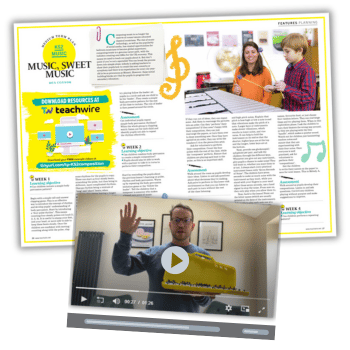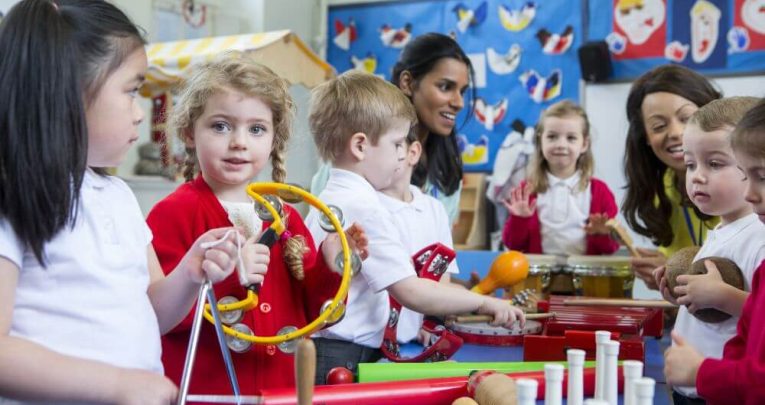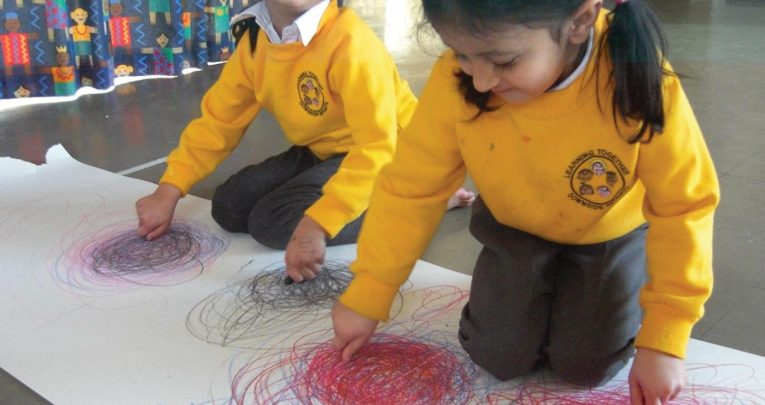The Benefits Of Whole Class Ensemble Tuition In KS2

Researchers from Birmingham City University have been studying the effect of WCET on pupils’ music experiences and attainment

- by Teachwire
- Classroom expertise and free resources for teachers

Across England, the teaching and learning of music has been taking place under ‘whole class ensemble tuition’ (WCET).
This usually involves a visiting music teacher from a hub or service coming in to school and teaching whole class music lessons using a range of orchestral, band, rock, pop and world music instruments.
Most commonly this takes place in Y4, with the whole class learning to play the same instrument, the trumpet for example, at the same time.
In many schools, the class teacher learns to play the same instrument alongside her or his pupils. Funding for this initiative comes from the government via Arts Council England, which provide £75 million annually to music hubs and services in England.
This money is used to provide a range of musical learning opportunities throughout the country, of which WCET is one of the core activities.
We’ve been looking at this topic from a number of perspectives. In the academic year 2015-2016, we found that over 660,000 pupils were learning to play a musical instrument via WCET.
Of these, the vast majority (618,000) were primary children, with 236,000 of these in Y4. For many children this will be their first experience of learning to play an instrument. Indeed, this was the case for 442,000 primary children that year.
Among the many findings our research uncovered, we highlighted that WCET makes a real difference to the lives of the children involved, opening up new horizons for them and their schools, parents, and communities.
WCET programmes offer a huge opportunity for children to participate in music-making activities at local, regional, and, sometimes, national level too, with all of the associated musical performing, learning, and social benefits that this entails.
Music via WCET translates into making real differences to the lives of schools and the wider community. Thinking about the levels that are reached, it is important to note that musical learning is about much more than simply reaching instrumental competence.
WCET programmes are not just about producing the next generation of star instrumentalists, but designed to work for everyone. We found that across the country many pupils are reaching quite high levels of attainment.
Using the National Qualifications Framework to benchmark, we found that level one attainment was achieved by 187,000 pupils; level two by 44,000; and level three by 21,000. What these figures show is a pyramid of attainment with a very broad base and, as might be expected, a much narrower apex.
We also found that the broad spectrum of opportunities offered in primary schools reduces somewhat as pupils transfer up into secondary school. A number of the participants in our research observed that music is being squeezed out of the curriculum.
This is having an effect on the numbers of pupils carrying on with music as they get older. Another issue for primary schools is the organisation of the timetable, with numeracy and literacy often prioritised as ‘morning’ activities, and everything else taking place in the afternoon.
This restricts the number of WCET sessions that can be offered if schools are unwilling for musical learning to take place before lunch.
Many music hubs have invested heavily in providing instruments which remain in schools. We know that for cultural reasons some schools are unwilling to allow these instruments to be taken home. Some 60% of schools keep the instruments on the premises, whereas the remaining 40% often do allow instruments to go home.
One of our respondents said, “Learning an instrument without the ability to practise at home is simply pointless”. For many parents, buying a musical instrument for their child involves significant expense. However, we know that many music shops offer rental programmes, and many hubs have an instrument loan bank.
WCET is provided on a whole range of instruments of varying cost, and hubs are working closely with their communities to enable all children to succeed with their musical learning.
Our research showed WCET is making a huge difference to musical learning throughout England, and it is to be hoped that when funding is reviewed in 2020, politicians will see the importance of this and similar programmes and ensure that funding remains.
Professor Martin Fautley, Dr Adam Whittaker & Dr Victoria Kinsella are based at the Centre for the Study of Practice and Culture in Education at Birmingham City University.







